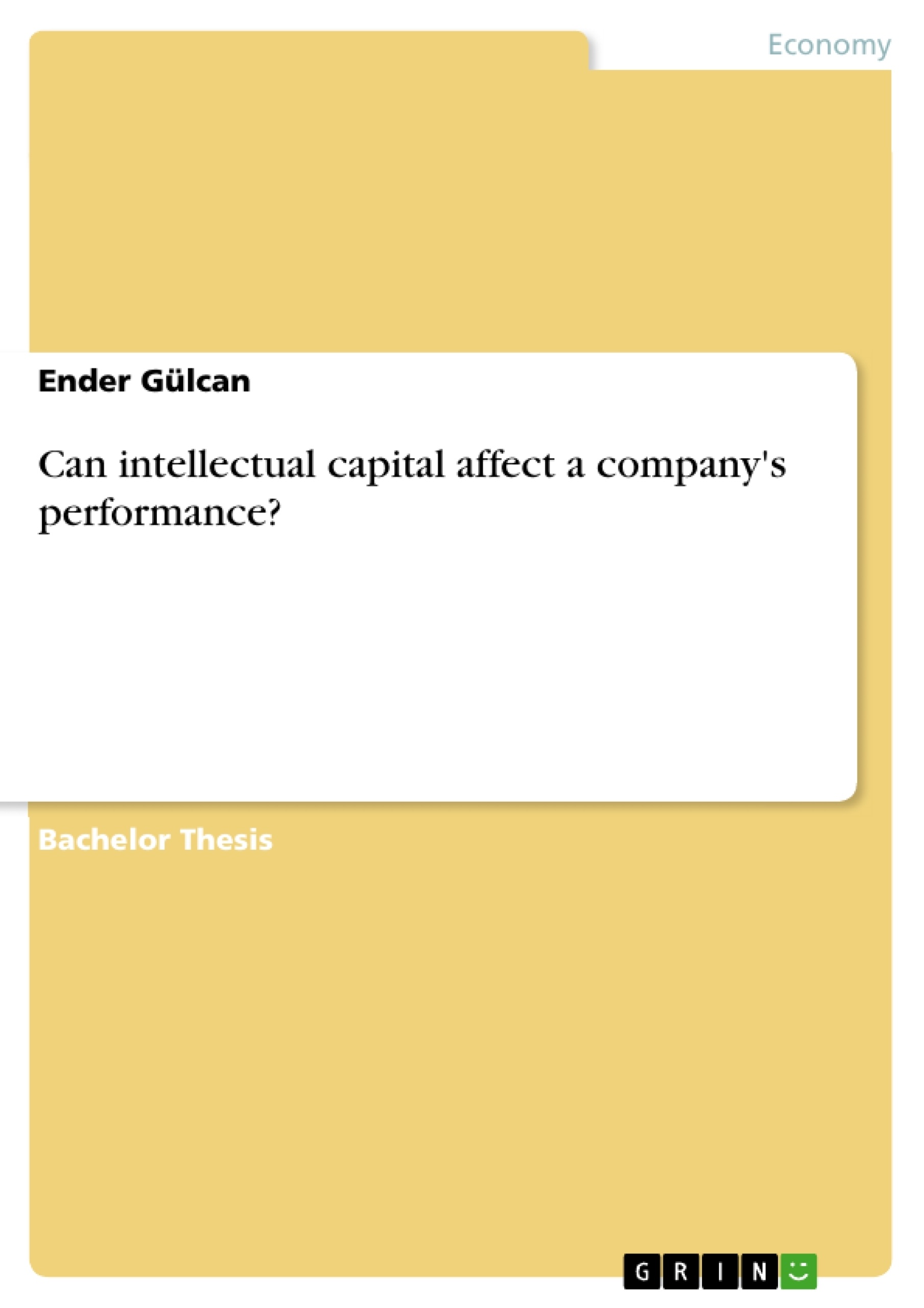This thesis investigates the relationship between corporate intellectual ability and performance. The link between intellectual capital and corporate performance has been advocated for decades, however, empirical studies failed to fully acknowledge this relationship.
For the conduct of this thesis, data has been collected for 1780 business years from companies of all industries from 5 developed countries. The contribution of this thesis has been the analysis of data from not only one country or certain industries, but the analysis of an extensive dataset, without making separations of industries, in order to obtain general results.
During the last decades, our economy was undergoing a crucial change. This change affects the production of goods and services as well as the value of the goods and services. It is the change of the balance between the resources which are exploited by companies. It is the shift from material resources to knowledge, the shift from quantity to quality - the shift which manifests itself in the change of the way value is being created.
Caused by these environmental changes, research activities in the field of intellectual capital (IC) emerged. It was advocated, that the new environment now requires proper IC management in order to succeed in the market. Since the end of the 90’s, the strategic importance and management of IC are well advocated. Several authors associated corporate performance with an efficient management of IC.
Inhaltsverzeichnis (Table of Contents)
- Chapter 1: Introduction
- Chapter 2: Literature Review
- Introduction
- The Knowledge Economy
- Market Value vs. Book Value:
- Definition of Intellectual Capital.
- Importance of IC Measurement.
- IC measurement Models
- Value Added Intellectual Coefficient - VAIC™.
- Review of Empirical Studies
- Hypotheses Development
- Chapter Summary
- Chapter 3: Methodology and Methods
- Introduction
- Research Philosophy
- The Research Approach.........
- The Research Method.
- Design of the Study.
- Measurement of Variables
- Regression Models
- Sampling Process
- Method of Data Collection.
- Data Analysis
- Credibility and Limitations of the Applied Methods.
- Ethical Considerations.
- Chapter Summary
- Chapter 4: Data Analysis and Discussion of Findings
- Descriptive Statistics
- Correlation Analysis.
- Regression Analysis..
- Regression Analysis - Model 1, Model 3 & Model 5
- Regression Analysis - Model 2, Model 4 & Model 6
- Chapter 5: Summary and Conclusions
Zielsetzung und Themenschwerpunkte (Objectives and Key Themes)
This thesis investigates the relationship between a company's intellectual capital and its performance. The research aims to empirically examine this relationship using data from public listed companies in five developed countries. By analyzing a large dataset, the study seeks to provide a comprehensive overview of the link between intellectual capital and corporate performance.
- The impact of intellectual capital on a company's performance
- The role of different intellectual capital components (human capital efficiency, structural capital efficiency, and capital employed efficiency) in influencing performance
- The application of the Value Added Intellectual Coefficient (VAIC™) for measuring intellectual capital
- The effectiveness of various regression models in predicting a company's performance based on intellectual capital factors
- Comparison of the findings with previous studies, particularly those focused on developing countries
Zusammenfassung der Kapitel (Chapter Summaries)
Chapter 1 provides an introduction to the research topic, outlining the importance of intellectual capital in today's economy and highlighting the gap in existing research. Chapter 2 delves into the literature review, exploring key concepts related to intellectual capital, its measurement, and its relationship with corporate performance. This chapter also examines previous empirical studies, identifies relevant frameworks, and establishes hypotheses for the research. Chapter 3 focuses on the research methodology, outlining the research philosophy, approach, method, and data collection process. It also discusses the chosen regression models and the sampling process. Chapter 4 presents the analysis of the collected data, covering descriptive statistics, correlation analysis, and regression analysis. It explores the relationship between intellectual capital components and performance indicators, evaluating the predictive power of the regression models. Finally, Chapter 5 summarizes the findings of the research and draws conclusions based on the analysis, contributing to the understanding of the complex relationship between intellectual capital and corporate performance.
Schlüsselwörter (Keywords)
This thesis focuses on the relationship between intellectual capital and corporate performance. Key concepts explored include intellectual capital measurement, Value Added Intellectual Coefficient (VAIC™), human capital efficiency, structural capital efficiency, capital employed efficiency, profitability, productivity, and market valuation. The research utilizes regression models to analyze data from public listed companies across developed countries.
Frequently Asked Questions
What is Intellectual Capital (IC) and why does it matter?
Intellectual Capital refers to the intangible assets of a company, such as knowledge, employee skills, and organizational structures. It is crucial because value creation has shifted from material resources to knowledge.
What is the VAIC™ model used in this study?
The Value Added Intellectual Coefficient (VAIC™) is a measurement tool that evaluates how efficiently a company uses its intellectual and physical resources to create value.
Does the study find a link between IC and corporate performance?
Yes, the thesis investigates this relationship using data from 1,780 business years across five developed countries to determine if efficient IC management leads to better performance.
What are the three components of VAIC™ analyzed?
The model looks at Human Capital Efficiency (HCE), Structural Capital Efficiency (SCE), and Capital Employed Efficiency (CEE).
How does this study differ from previous research in this field?
Unlike many studies that focus on single industries or developing countries, this thesis uses an extensive dataset from multiple developed countries without industry separation to obtain general results.
- Quote paper
- Ender Gülcan (Author), 2017, Can intellectual capital affect a company's performance?, Munich, GRIN Verlag, https://www.grin.com/document/376516



